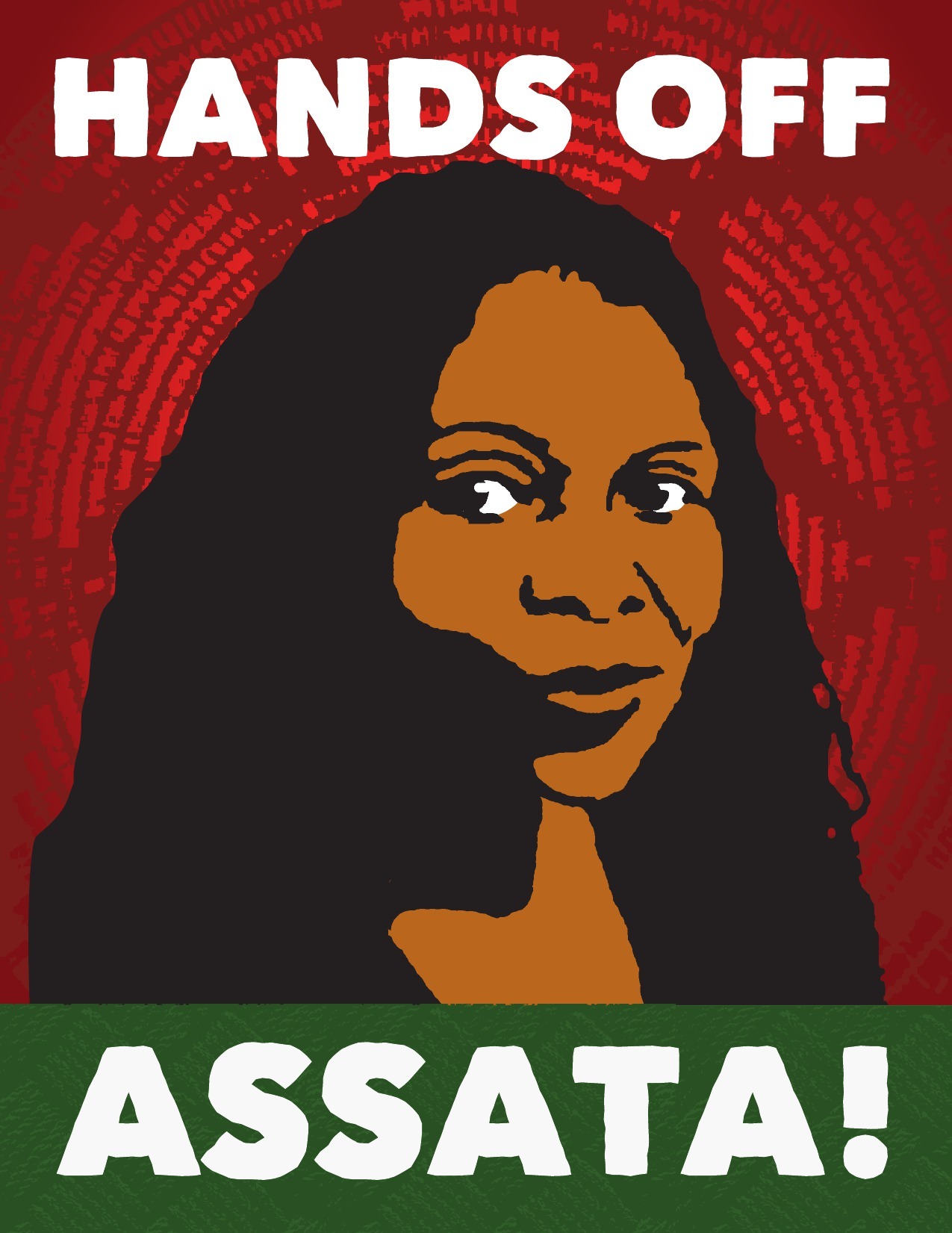 An portrait of a Black woman's head and shoulders on a red background with the words "Hands off Assata." By Dignidad Rebelde.
An portrait of a Black woman's head and shoulders on a red background with the words "Hands off Assata." By Dignidad Rebelde.
Assata Shakur is Still Welcome Here
How will Obama's new approach to Cuba affect the exiled revolutionary Assata Shakur?
By Queen Arsem-O'Malley and Isabelle Nastasia
Assata Olugbala Shakur is on our minds today.
Yesterday, Obama announced that the U.S. and Cuba would normalize diplomatic relations, after almost 54 years of embargo. A White House fact sheet, dubbed “Charting a New Course on Cuba”, outlines the changes in relations, including the creation of a US embassy in Havana and, notably, a report on the U.S.’s designation of Cuba as a State Sponsor of Terrorism. It is unclear what these policies will mean for returning self-determination to the people of Cuba.
Of course, many of us immediately thought: what about Assata?
Born in 1947, Assata Shakur is known for her activism as a City University of New York student and her dedication to self-determination to oppressed peoples as a Black Panther and member of the Black Liberation Army. Authorities tried to charge Assata with alleged murder, attempted murder, and bank robbery; in 1977, she was convicted of murder of a New Jersey state trooper – who was killed in a shootout where Assata was shot with her hands up – and imprisoned. While incarcerated, she was placed in solitary confinement for over 21 months.
In 1979, Assata escaped from Clinton Correctional Facility for Women in New Jersey with help from three members of the Black Liberation Army, who freed her after seizing two prison guards at gunpoint and liberating a prison van for their escape. No one was injured during Assata’s jailbreak.
In a world where prisons and detention centers kidnap and cage people as an extension of the legacy of slavery and white supremacy – a world where the U.S. is home to 5% of the world’s population but 25% of the world’s incarcerated peoples – it’s important to think about jailbreaks as part of a larger strategy to free all incarcerated people. Today, as police and prison abolition gain mainstream traction, revisiting this history should be an urgent project of our current political moment.
In 1984, Assata was granted asylum in Cuba. While in exile, Assata has written two books, and has continued to write and act for the abolition of capitalism, the prison-industrial complex, and the racist police state. (If you haven’t already, read Assata: An Autobiography, the full text of which is online here.) But under Obama’s plan, Cuba will soon have an American state presence on their soil – hence the immediate reappearance of #HandsoffAssata upon this morning’s news.
Concern for Assata’s asylum is heightened by the actions of the police state last year: in May 2013, 34 years after her escape from prison, the FBI added her to the Most Wanted list, in addition to a $2 million bounty on her head. It was a move that was quickly denounced by Angela Davis and Lennox Hinds and torn apart by The Nation’s Mychal Denzel Smith. “To understand how this petite woman from Queens, New York, came to threaten the US government as much as men reportedly linked to Hezbollah and Al Qaeda, you have to backtrack. You’ve got to connect the dots between rappers like Common and Chuck D name-checking her in song, the wider context of the Black Power movement, and the tension between Black revolutionaries and the State,” wrote Tshepo Mokoena in VICE.
To connect those dots to today, New Jersey-based news sources have just reported that state authorities hope that diplomatic relations will “aid the capture and return” of Assata.
Meanwhile, young organizers continue to fight for freedoms and live Assata’s legacy. Students at City College of New York have struggled to keep the Guillermo Morales/Assata Shakur Community and Student Center, named for two former CCNY students and revolutionaries, an autonomous space.
The young, Black, queer, woman-led Ferguson-based group Millennial Activists United, which has received national attention in the last few weeks, is raising money for the organization while keeping Assata’s name on the front lines. In addition to paying homage to Assata in style, the group also closes almost all of their actions with her words.
As Rosa Clemente said, if we are chanting Assata quotes and wearing Assata hoodies, we better be ready to keep her free. Philip Agnew, Executive Director of the Dream Defenders, has said that #BlackLivesMatter is our generation’s Black Power. And decades after Black Power first became a visible movement in the United States, the incarcerated population in this country is 40% Black, police are consistently killing unarmed Black folks with no consequence, and people are being abused and killed in U.S.-run prisons both domestically and internationally. Young leaders have reminded us that the struggle for the liberation of oppressed peoples is the same fight from Ferguson to Palestine, that we stand in global solidarity.
Now, let us honor Assata’s legacy by going beyond demands for reform towards visions and strategies for abolition of policing and prisons.
Photo by Dignidad Rebelde. Check out their work here
Queen Arsem-O'Malley and Isabelle Nastasia
Catch up with me @qaween.

